Introduction: Keyword research for SEO
Imagine you’re a chef preparing a meal for a large group of people. You have all the crucial ingredients, utensils, and cookware you need, but you’ve no idea what recipe to follow.
Dahh!! You start throwing ingredients together, hoping for the best, but your meal turns out to be a disaster in the end.
The same can be said about keyword research for SEO. You have all the tools you need, but without a recipe or plan, you won’t achieve the desired results. It helps you discover what your audience is looking for and what keywords they use to find information online.
Needless to say, you can make your online business growth easier by partnering with an affordable search engine optimization agency USA. However, if you want to boost your online presence on your own, then this blog is only for you.
In this blog, we’ll discuss why keyword research is essential for SEO success, how to conduct effective research, and the best keyword research strategies to help you optimize your website and increase its visibility.
What is keyword research in SEO?
Keyword research is the process of analyzing and identifying the keywords, search terms, and phrases people use when searching for information online. Keyword research aims to identify the keywords that relate to your business & target audiences and find ‘good’ keywords that will bring you lots of targeted traffic.
For instance, if you have a personal training business or a gym, keyword research will help you discover relevant keywords such as “best exercises to lose fat,” “men’s chest workouts,” etc.
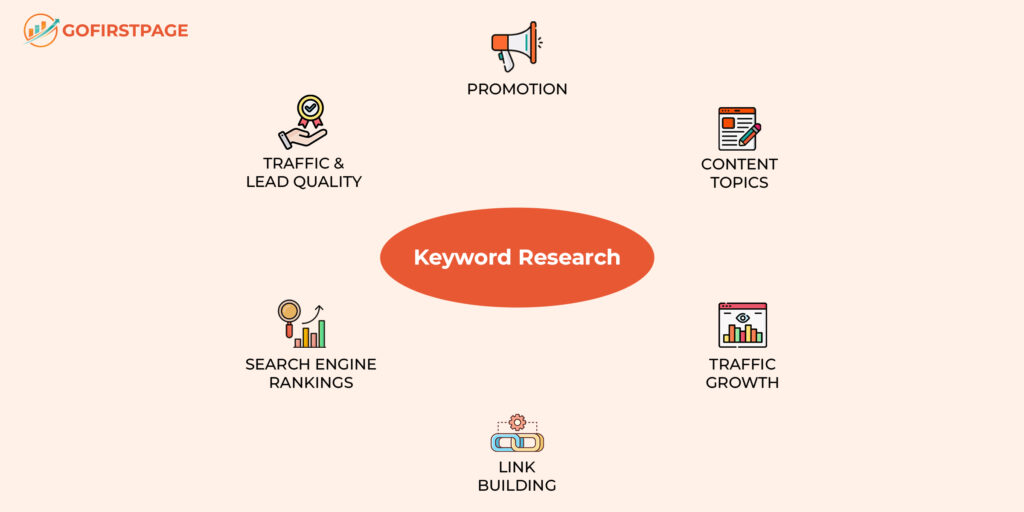
Search engines use these keywords to understand the content of your website. By understanding what keywords people use to search for products, services, and information related to your business, you can optimize your website’s content to target those keywords and improve your website’s visibility in search engine results pages (SERPs).
Why Is Keyword Research Important For SEO?
Keyword research is critical for SEO success because it helps you understand what your target audience is searching for and what keywords and phrases they use to find your business.
As mentioned above: Optimizing your website’s content around these keywords improves your website’s search engine rankings & attract more targeted traffic to your business site.
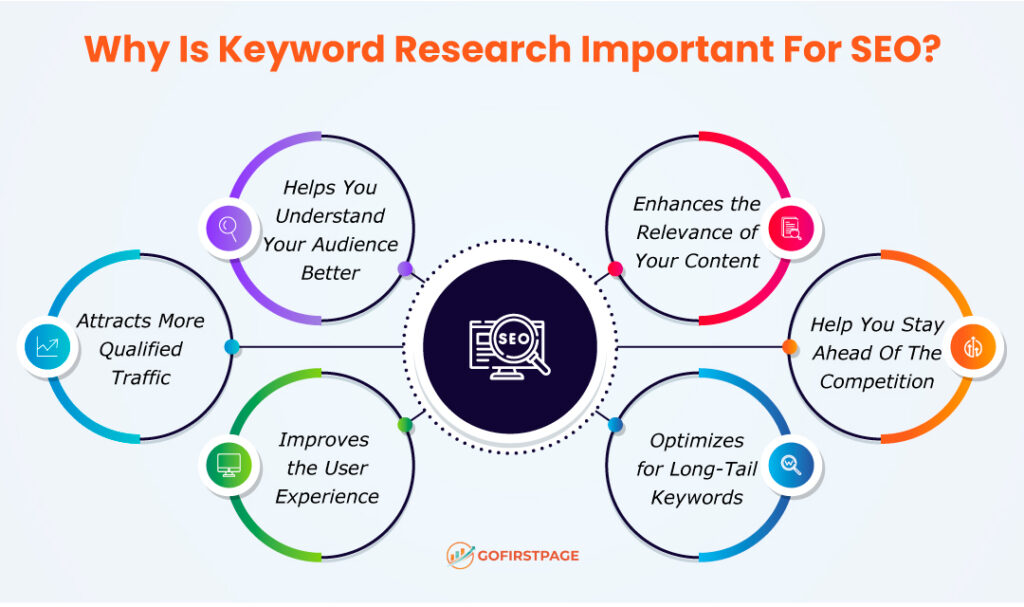
Note: Without keyword research, you’re guessing what keywords to optimize, leading to wasted time, resources, and ineffective SEO strategies. Keyword research is crucial for SEO success for several reasons:
1- Helps You Understand Your Audience Better
Keyword research is an effective way to gain insight into your target audience’s needs, interests, and pain points. It helps you better understand your audience by providing the right insights into what keywords & phrases they use to find information and services online.
It gives you instant feedback on whether or not a content idea or a keyword is worth spending time and resources on. This basic knowledge helps you create content (blogs & service pages) that resonates with your audience and meets their needs, resulting in increased engagement and higher conversion rates.
2- Enhances the Relevance of Your Content
One of the primary objectives of SEO is to ensure that your site’s content is relevant to the search queries users enter. Searching for information online helps you identify your target audience’s most relevant keywords and phrases. Keyword research helps you optimize your website’s content by targeting relevant keywords and phrases.
Including these keywords and phrases in your content can increase the chances of your website ranking higher in SERPs and appearing at the top of the search results page when users enter a specific phrase or keyword. If you need help with SEO content or don’t have the time to strategize the well-framed content that ranks, contact us for affordable content marketing services now.
3- Attracts More Qualified Traffic
SEO helps to attract more traffic to your site, but not all traffic is qualified or relevant. Keyword research lets you identify the keywords and phrases your target audience uses to find information online. Optimizing your content for the right keywords can attract more qualified traffic to your site.
In short, people who are genuinely interested in your products or services are more likely to find your website and engage with it. These people will likely convert into customers or take other desired actions on your website. Need SEO and sales assistance? Call us now @ +1 (917) 277-7780
4- Help You Stay Ahead Of The Competition:
Keyword research should be the first step all web admins and marketers follow when revamping a business. It helps you stay ahead of your competitors & keep tabs on what they are doing when it comes to SEO.
By properly analyzing the keywords & phrases they target, you can identify content gaps and find opportunities to target keywords your competitors may have missed. This enables you to compete with your competitors and ranks higher in SERPs, attracting more traffic and potential customers to your site.
5- Improves the User Experience
SEO is not just about ranking high in search engine result pages; it’s also about providing a positive and responsive user experience. Keyword research benefits you by identifying the keywords and phrases your target audience uses to find information online, enabling you to create optimized content for their needs.
By providing valuable keyword-rich content and responsive website design, you create a positive user experience, which results in increased engagement, longer time spent on the site, and lower bounce rates. If your website isn’t mobile-friendly, consider partnering with an affordable website design & development agency now.
6- Optimizes for Long-Tail Keywords
Long-tail keywords are phrase-based search terms with five or more words. People use these longer phrases to search for pertinent information online.
Despite having a lower search volume than shorter ones, long-tail keywords are a great way to gradually increase SEO traffic because they face much less competition than short-tail keywords. Long-tail keywords are more specific to a particular niche or topic.
By researching the proper keyword & including them in your content, you can target a more specific audience and attract more qualified traffic to your site. Moreover, the conversion rates for these keywords are higher as they are used by searchers looking for specific information, products, or services you are offering.
How To Do Keyword Research For SEO? What Effective Strategies To Follow?
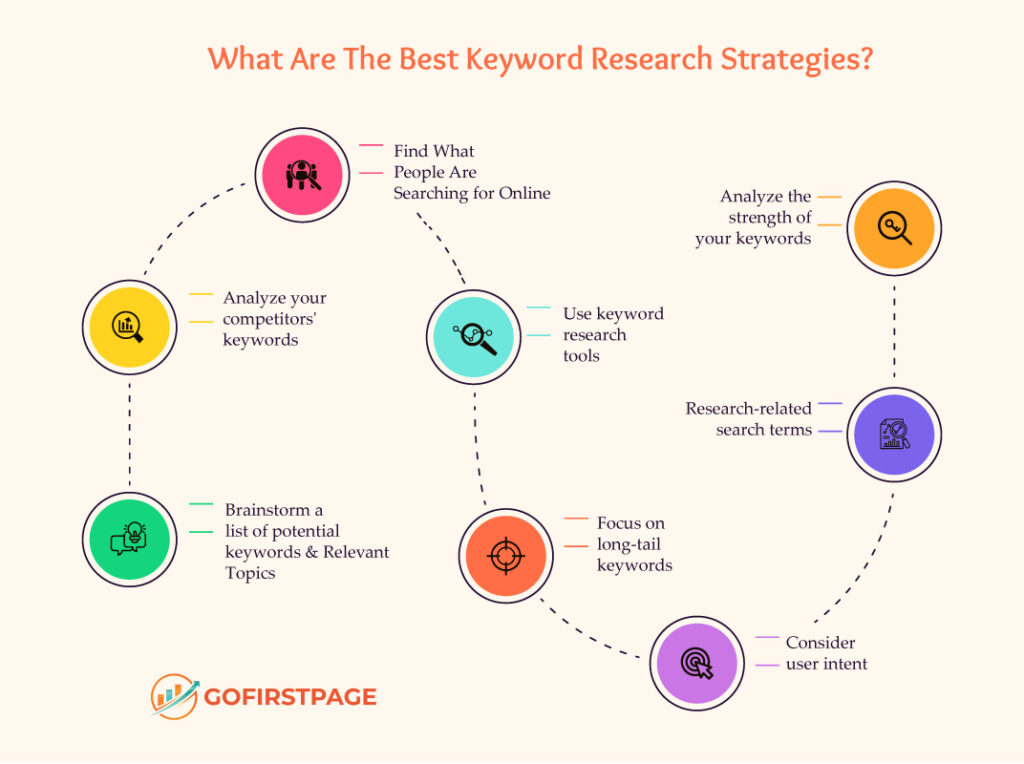
1- Brainstorm a list of potential keywords & Relevant Topics
Brainstorm a list of potential keywords and topics relevant to your business or industry. These topics can be broad or specific but should be relevant to your audience. Think about the products or services you offer and the problems your business solves for your customers. Think about what your business’s main themes and topics are.
For example, see how we deliver this informative topic to you, which is relevant to our SEO marketing services. In this way, you have to identify the topics as well as the keywords. Once you have your primary keyword, you can use various keyword research tools to find related keywords and additional trending keyword ideas.
2- Analyze your competitors’ keywords
Analyzing the keywords of competitors can help you identify new opportunities and improve your targeting strategy. By analyzing their keywords, you can see what keywords your competitors are targeting and which ones generate the most traffic and leads.
To analyze your competitors’ keywords, you can use keyword research tools like SEMrush or Ahrefs. Simply enter your competitors’ website URLs into the domain section, and it will show you what keywords they’re targeting and how many keywords are getting organic ranking and traffic.
3- Use keyword research tools
Keyword research tools are essential for finding relevant and profitable keywords for your website. These tools allow you to see each keyword’s search volume, competition, and other metrics, helping you decide which keywords to target.
Several keyword research tools are available, including:
Google Keyword Planner: This free keyword research tool from Google helps you find relevant keyword ideas related to your business. It shows you the monthly search volume and competition for each keyword and suggests new keywords to target.
SEMrush: It’s a paid keyword research tool that provides a wealth of data on keywords, including search volume, competition, related questions, keyword difficulty, and related keywords. It also lets you track your keyword rankings and analyze your competitors’ keywords.
Ahrefs: Ahrefs is another paid keyword research tool that provides comprehensive keyword data, including competition, search volume, and keyword difficulty. It also allows you to analyze your competitors’ keywords and track your keyword rankings.
4- Find What People Are Searching for Online
When conducting keyword research, you can get insights into what people are searching online. This data is crucial because it provides immediate feedback on whether a content idea is worth your time and resources.
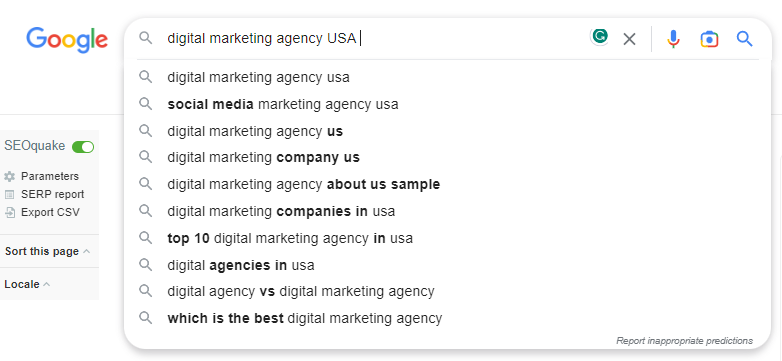
Essentially, you want to create content targeting keywords people already use to find information online. It’s no use creating content based on what your target audience is searching for.
5- Focus on long-tail keywords
Long-tail keywords are more specific phrases people use to search for information online. While they have lower search volume than broad keywords, they tend to have higher conversion rates because they’re more specific to the user’s search.
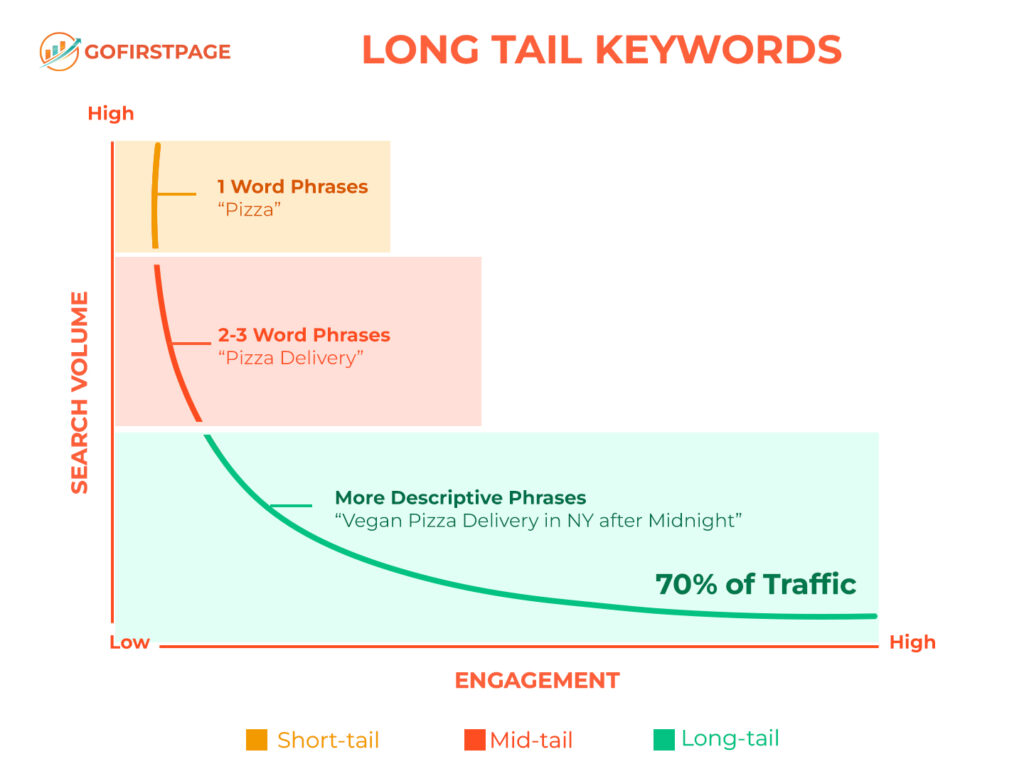
For example, instead of “digital marketing,” you could target the long-tail keyword “digital marketing agency in New York.” This keyword is more specific and likely attracts relevant users looking for a digital marketing agency in New York. Also, include “near me” with the keyword to make it a long-tail keyword for GMB optimization.
6- Consider user intent
User intent refers to the mindset or the reason behind a user’s search query. Understanding user intent is crucial for targeting the right keywords and creating content that meets the user’s needs.
There are four types of user intent:
Informational intent: The user seeks information on a particular topic.
Commercial intent: The user wants to purchase a product or service.
Transactional intent: The user is ready to make a purchase.
Navigational intent: The user seeks a specific website or webpage.
By understanding user intent, you can target keywords that match the user’s intent and create content that meets their needs.
If you’re having trouble finding additional keywords for a particular subject, look at the related search terms that pop up when you enter a keyword into Google.
You’ll find some search suggestions for your initial phrase when you type it into Google and scroll to the bottom of the results. These keywords may give you inspiration for additional terms to use.
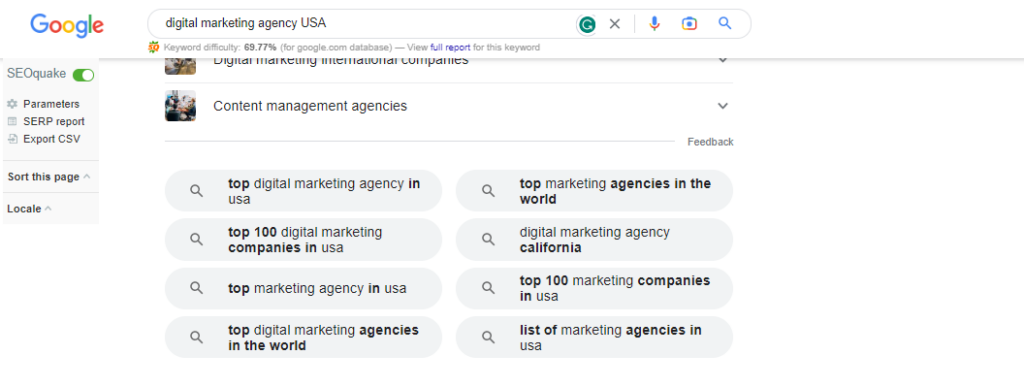
8- Analyze the strength of your keywords
Using a keyword research or SEO tool, such as Keyword Planner, is the simplest way to complete the following step. Some of the most well-known ones are Ubersuggest, Ahrefs, Semrush, and Wordtracker. You can start with the free versions of Wordtracker and Ubersuggest.
- When you analyze your keywords, you should look for the following:
- What is the exact search term? Ensure your keyword phrase matches the precise search term people use.
- How difficult is the competition? The tools that charge money distinguish between competition for paid advertisements and organic search. You want a higher search volume with less competition in organic search. The sweet spot is there.
- How many people are searching? Building your strategy around a keyword phrase nobody uses won’t be very helpful. Look for the most popular search term.
- Check for related terms you may have missed with high search volume and low organic search competition.
Conclusion: Importance of Keyword Research In SEO
Keyword research is integral to any successful SEO strategy. Follow the keyword research tips we’ve discussed in this blog, and you’ll be well on your way to staying ahead of your competitors, improving your website’s search engine rankings, attracting more qualified traffic, and increasing revenue.
By understanding the keywords and phrases your target audience uses to find information online, you can create relevant, valuable content that meets their needs and optimize your website’s content to improve your website’s visibility in SERPs. This results in improved user experience, increased engagement, and higher conversion rates. Improve your website’s visibility in SERPs & boost conversion and sales rates with the help of top affordable SEO services. Get a free consultation now or call us @ +1 (917) 277-7780
Frequently Asked Questions
Ans: Keyword research involves identifying the most relevant keywords & phrases targeted customers use to search for products or services. Keyword research is the foundation of SEO because it helps identify the keywords your potential audience uses to find products or services your business offers or sells. SEO is optimizing a website to rank higher on search engine results pages (SERPs) for these keywords.
Que: Why is keyword research important for SEO?
Ans: Keyword research is critical for SEO success because it helps you understand what your target audience is searching for and what keywords and phrases they use to find your business. Optimizing your website with these keywords can improve your SERP rankings and drive more traffic to your website. Keyword research also helps you to understand your audience better, which can help you to create more targeted and effective content. Need help in identifying top keywords and online business growth? Partner with us: Call us now @ +1 (917) 277-7780
Que: How do I conduct keyword research for SEO?
Ans: To conduct keyword research for SEO, start by brainstorming a list of keywords & phrases relevant to your business. Use keyword research tools such as Google Keyword Planner, SEMrush, or Ahrefs to identify the monthly search volume, competition, top-ranking sites, related search terms, keyword difficulty, and potential traffic for these keywords. Moreover, find what people are searching for online, consider user intent, and analyze the strength of your keywords and long-tail keywords with lower competition, which can help you to rank higher on SERPs.
Que: What are long-tail keywords, and why are they important for SEO?
Ans: Long-tail keywords are long phrases that are more specific and targeted than broad ones. They often have lower search volume but are easier to rank for because they are less competitive. Long-tail keywords attract more targeted traffic to your website & increase your chances of converting visitors into customers. Our expert small business/ecommerce SEO services follow effective strategies to boost your online presence fast.
Que: How can I use keyword research to optimize my website content?
Ans: Once you identify the most relevant keywords for your business, use them to optimize your site content. Incorporate these keywords into your website copy, headings, meta descriptions, and URLs. However, you must avoid keyword stuffing. Using keywords naturally and organically is important.
Que: How often should I conduct keyword research for my website?
Ans: Keyword research is an ongoing process. It’s important to regularly update your keyword strategy to keep up with the industry trend changes & search behavior. It’s recommended to conduct keyword research at least once every month or whenever you add new products or services to your website.
Que: How does keyword research help in my local SEO?
Ans: If you have a local business, optimizing your website for local SEO is necessary by targeting keywords that include your city or region. For example, a local keyword can be“plumbers in san diego.” Use location-specific keywords, meta descriptions, headings, and URLs in your website copy. Additionally, ensure your website is listed on local directories like Google My Business and Yelp.
Que: Why should I hire an SEO agency?
Ans: An SEO agency specializes in helping businesses improve their SERP rankings through various technical strategies, including keyword research, SEO content creation, and high-quality link building. Partnering with a renowned and affordable SEO agency can be beneficial if you don’t have the time or resources to manage your SEO efforts or want to ensure that your SEO strategy is handled by professionals who can deliver top-notch results. Call our experts now @ +1 (917) 277-7780 or visit our website at gofirstpage.com




